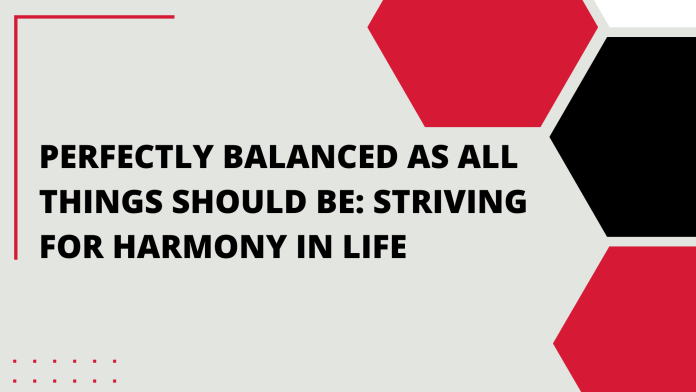In today’s fast-paced world, finding balance can be a challenge. With the demands of work, family, and personal goals, it’s easy to feel overwhelmed. But achieving balance is essential for leading a fulfilling life. In this article, we will explore the concept of balance and provide practical tips to help you achieve it. So, let’s dive in and discover how to live a life that is perfectly balanced as all things should be.
Table of Contents
- Introduction
- What is Balance?
- The Importance of Balance
- Signs of Imbalance
- Strategies for Achieving Balance
- Prioritizing Your Time
- Setting Boundaries
- Embracing Self-Care
- Finding Your Passion
- Seeking Support
- Balancing Work and Personal Life
- Achieving Physical Health and Well-being
- Nurturing Mental and Emotional Balance
- Balancing Relationships
- Balancing Financial Stability
- The Role of Mindfulness
- The Journey Toward Balance
- Conclusion
- Frequently Asked Questions (FAQs)
What is Balance?
Balance is the state of equilibrium where different elements or aspects of your life are in harmonious proportions. It involves allocating time, energy, and focus to various areas such as work, family, health, and personal growth, ensuring that none of them dominates your life excessively. Think of it as a tightrope walker gracefully navigating their path, never leaning too far in one direction.
The Importance of Balance
Balancing your life is crucial for several reasons:
- Mental and Emotional Well-being: Balance reduces stress, anxiety, and burnout, leading to improved mental health.
- Physical Health: It promotes a healthier lifestyle, reducing the risk of health problems caused by chronic stress or neglecting self-care.
- Productivity: Balanced individuals tend to be more productive, as they manage their time effectively.
- Fulfillment: Achieving balance leads to a more fulfilling life, where personal and professional goals are met.
Signs of Imbalance
Before we delve into strategies for achieving balance, it’s essential to recognize the signs of imbalance:
- Feeling overwhelmed and stressed.
- Neglecting self-care and health.
- Neglecting important relationships.
- Frustration and lack of motivation.
- A constant feeling of being behind on tasks.
Strategies for Achieving Balance
Prioritizing Your Time
Time management is key to balance. Prioritize tasks and set realistic goals. Learn to say no when necessary and avoid overcommitting.
Setting Boundaries
Establish boundaries in both personal and professional life. This prevents others from encroaching on your time and helps maintain equilibrium.
Embracing Self-Care
Take time for self-care activities, such as exercise, meditation, or simply relaxing with a good book. These moments recharge your energy.
Finding Your Passion
Pursue hobbies and interests that bring you joy. Engaging in activities you love helps create a sense of balance.
Seeking Support
Don’t be afraid to seek support from friends, family, or professionals when needed. Asking for help is a sign of strength.
Balancing Work and Personal Life
Balancing work and personal life is a common challenge. Consider flexible work arrangements, time management, and quality family time to achieve harmony.
Achieving Physical Health and Well-being
A balanced life includes physical health. Maintain a balanced diet, exercise regularly, and get adequate sleep to ensure overall well-being.
Nurturing Mental and Emotional Balance
Practice mindfulness and stress management techniques. Seek therapy or counseling if you’re struggling with emotional balance.
Balancing Relationships
Prioritize nurturing relationships with loved ones. Communication, quality time, and empathy are essential for relationship balance.
Balancing Financial Stability
Financial stability is part of a balanced life. Create a budget, save, and invest wisely to secure your financial future.
The Role of Mindfulness
Mindfulness practices, such as meditation and deep breathing, help you stay present and maintain balance in the midst of chaos.
The Journey Toward Balance
The path to balance is ongoing. Embrace the journey, learn from your experiences, and adapt as needed. Remember that achieving balance is not a destination but a way of life.
Conclusion
In a world where chaos often reigns, striving for balance is a noble endeavor. By prioritizing your time, setting boundaries, and embracing self-care, you can achieve a life that is perfectly balanced, just as all things should be.
Frequently Asked Questions (FAQs)
- Is achieving perfect balance possible? Achieving perfect balance may be challenging, but striving for it improves your overall well-being and satisfaction with life.
- How can I balance a demanding career with personal life? Balancing a demanding career with personal life requires effective time management, setting boundaries, and seeking support when needed.
- What are some quick self-care activities I can incorporate into my daily routine? Quick self-care activities include deep breathing exercises, short walks, and taking breaks to relax and recharge.
- Can mindfulness really help in achieving balance? Yes, mindfulness practices can help you stay grounded, reduce stress, and maintain emotional balance, contributing to an overall sense of equilibrium.
- What should I do if I feel overwhelmed and out of balance? If you feel overwhelmed, consider seeking guidance from a therapist or counselor. They can provide valuable tools and strategies for regaining balance in your life.
Remember that achieving balance is a personal journey, and it may take time to find what works best for you. Embrace the process, make adjustments along the way, and enjoy the benefits of a life perfectly balanced, just as all things should be.

